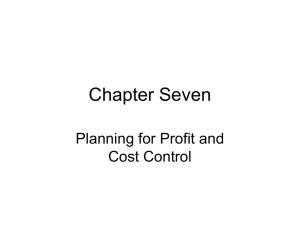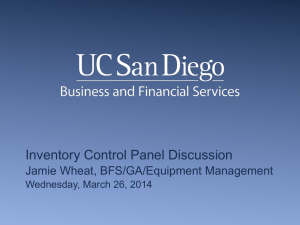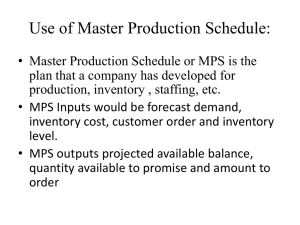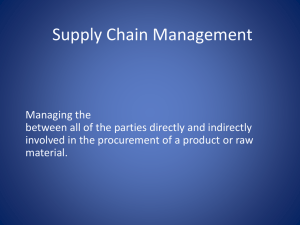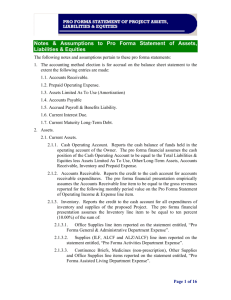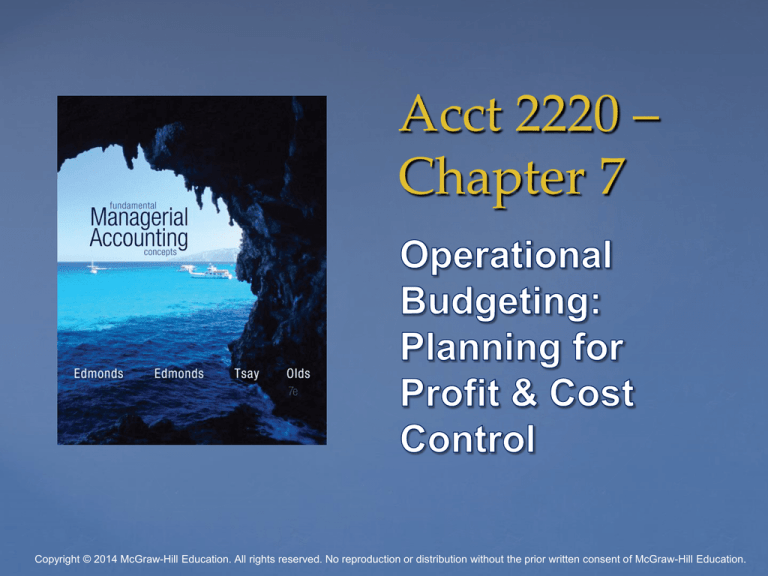
Acct 2220 –
Chapter 7
Copyright © 2014 McGraw-Hill Education. All rights reserved. No reproduction or distribution without the prior written consent of McGraw-Hill Education.
Learning Objective
Describe the
budgeting process
and the benefits it
provides.
LO1
7-2
Three Levels of Planning (pg 258)
1. Strategic Planning involves making long-term
decisions such as defining the scope of the business,
determining which products to develop or discontinue
and identifying the most profitable markets. (CAPSIM)
2. Capital Budgeting focuses on intermediate-range
planning and involves decisions such as whether to buy
or lease equipment, whether to stimulate sales, or
whether to increase company assets. (CHP 10)
3. The Operations Budget describes short-term
objectives in specific amounts of sales targets,
production goals, and financing plans. (*CHP 7*)
7-3
Advantages of Budgeting
Promotes
Planning
Promotes
Coordination
Budgeting
Enhances
Performance
Measurement
Enhances
Corrective
Actions
7-4
Budgeting and Human Behavior
Upper management must be sensitive to the impact of the
budgeting process on employees.
Budgets are constraining.
They limit individual
freedom in favor of an
established plan.
Many people find
evaluation based on budget
expectations stressful. Think
of students and exams!
Upper management must demonstrate that budgets
are sincere efforts to express realistic goals employees
are expected to meet.
7-5
Cash Receipts
and Payments
Schedules
Operating
Budgets
Start
Pro forma
Financial
Statements
Cash
receipts
Sales
budget
Income
statement
Cash
payments
for inventory
Inventory
purchases
budget
Balance
sheet
Cash
payments
for S & A
S&A
expense
budget
Statement of
cash flows
Cash
budget
7-6
Learning Objective
Prepare a sales
budget and related
schedule of cash
receipts.
LO2
7-7
Sales Budget
Detailed schedule prepared by the
marketing department showing expected
sales for the coming periods and expected
collections on those sales. It is critical to
the success of the entire budgeting
process.
7-8
Sales Budget
Hampton Hams (HH) is preparing a sales
budget for the last quarter of the year. Sales of
hams are expected to peak in the months of
October, November and December (the holiday
seasons). The store sales for October are
expected to total $160,000 ($40,000 in cash
sales, and $120,000 in sales on account). Sales
are expected to increase by 20% per month for
November and December.
Let’s prepare a sales budget!
7-9
Sales Budget: Projected Sales Section
Accounts receivable at December 31st are
$172,800, the uncollected sales on account.
$40,000 × 120% = $48,000
$120,000 × 120% = $144,000
7-10
Sales Budget: Schedule of Cash Receipts
Hampton Hams (HH) will collect cash sales in
the month of sale. Past experience shows the
company will collect cash from its credit sales
in the month following the month of the sale
(October credit sales will be collected in full in
November).
Next, let’s prepare the cash receipts budget.
7-11
Sales Budget: Schedule of Cash Receipts
Exhibit 7.2
Sales Budget
Sales revenue on the income statement will be
the sum of the monthly sales ($582,400).
7-12
Pro Forma Data
$160,000
7-13
Learning Objective
Prepare an
inventory purchases
budget and related
schedule of cash
payments.
LO3
7-14
Inventory Purchases
Budget
The total amount of inventory needed for
each month is equal to the amount of the
cost of budgeted sales plus the desired
ending inventory.
Cost of budgeted sales
Plus: Desired ending inventory
Total inventory needed
Less: Beginning inventory
Amount needed to purchase
XXX
XXX
XXX
(XXX)
XXX
7-15
Inventory Purchases Budget
HH’s policy is that ending inventory should be equal
to 25% of next month’s projected cost of goods sold.
At HH, cost of goods sold normally equal 70% of
sales.
Suppliers require HH to pay 60% of inventory
purchases in the month goods are purchased and the
remaining 40% in the month after the purchase.
Let’s prepare the inventory purchases budget and the
schedule of cash payments for inventory purchases.
January’s cost of goods sold is budgeted at $140,000.
7-16
Inventory Purchases Budget
$134,400 × 25% = $33,600
$155,960 × 40% = $62,384 Accounts Payable
7-17
$145,600 × 40% = $58,240
$145,600 × 60% = $87,360
7-18
Learning Objective
Prepare a selling
and administrative
expense budget and
related schedule of
cash payments.
LO4
7-19
Selling and Administrative
Expense Budget
The details of the Selling and Administrative (S&A)
Budget are shown next. It is important to note that
sales commission (based on 2% of sales) is paid in
the month following the sale, while supplies expense
(based on 1% of sales) is paid in the month of the
sale. The utility expense is paid in the month
following the usage of the electricity, gas, and water.
7-20
Selling and Administrative Expense Budget
7-21
Learning Objective
Prepare a cash
budget.
LO5
7-22
The (critical) Cash Budget
HH plans to purchase, for cash, store fixtures with a
cost of $130,000 in October. HH borrows or repays
principal and interest on the last day of each month.
Any money borrowed from the bank bears interest at
an annual rate of 12% (1% per month). The
management at HH wants to maintain a cash balance
of at least $10,000 at the end of every month.
7-23
The (critical) Cash Budget
7-24
The (critical) Cash Budget
7-25
(g) $212,028 - $188,368 - $13,000
7-26
Check Yourself
Astor Company expects to incur the following operating expenses
during September: Salary Expense, $25,000; Utility Expense,
$1,200; Depreciation Expense, $5,400, and Selling Expense,
$14,000. It pays operating expenses in cash in the month in
which it incurs them. Based on this information, the total amount
of cash outflow reported in the Operating Activities section of
the pro forma Statement of Cash Flows would be:
a. $45,600.
b. $31,600.
c. $40,200.
Depreciation Expense is a non-cash
charge to income and will not appear
on the Statement of Cash Flows.
d. $44,400
7-27
Learning Objective
Prepare a pro forma
income statement,
balance sheet, and
statement of cash
flows.
LO6
7-28
Pro Forma Income Statement
The pro forma income statement gives management
an estimate of the expected profitability of HH. If
the project appears to be unprofitable, management
can make the decision to abandon it. Although
managers remain responsible for data analysis and
decision making, computer technology offers
powerful tools to assist in those tasks (i.e. Capsim).
7-29
Pro Forma Income Statement
7-30
Pro Forma Balance Sheet
The new store has no contributed capital because
its operations will be financed through debt (line-ofcredit) and retained earnings. The amount of
retained earnings will be equal to the net income
because there are no prior periods. The fixtures
purchased in October will be depreciated for a full
three months. Total accumulated depreciation will
be $3,000.
7-31
7-32
Pro Forma Statement of Cash
Flows
Almost all the information for the Pro Forma
Statement of Cash Flows can be found on the
Cash Budget.
7-33
7-34
End of Chapter 7
7-35

